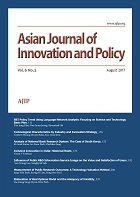 ISSN : 2287-1608
ISSN : 2287-1608
Research Productivity of Graduate Students in GPF program of Korea
Abstract
This study analyzed the factors that influence the research productivity of 236 graduate students who are funded by the Global Ph.D. Fellowship Program of the National Research Foundation of Korea. Research productivity was measured by the number of SCI publications, and the explanatory factors are the demographic factor, the financial factor, the reputation of institutions and the supervisor factor. This study included 2 indices such as the reputation of institutions and the research productivity of supervisors to check the halo effect unlike other studies. Results are as follows: 1) no gender difference, 2) better performance by younger age group, 3) no difference even if the students are additionally funded by other research support programs, 4) no halo effect by the reputation of institution but rather better performance from low ranked universities, 5) and a positive halo effect by supervisors.
- keywords
- Graduate Research Fellowship, research productivity, Halo effect, advisor effect
Reference
Avital, M. and Collopy, F. (2001) Assessing research performance: implications for selection and motivation, Sprouts, 1(3), 40-61, http://sprouts.case.edu/2001/ 010303.pdf.
Babu, A.R. and Singh, Y.P. (1998) Determinants of research productivity, Scientometrics, 43(3), 309-329.
Bain, S., Fedynich, L.V. and Knight, M. (2009) The successful graduate student: a review of the factors for success, Journal of Academic and Business Ethics, 3, 1-9.
Cardoso, A.R. (2008) Comparing the early research performance of PhD graduates in labor economics in Europe and the USA, IZA (The Institute for the Study of Labor) Discussion Paper, No. 3898,December 2008.
Cho, H.S. (2007) The Matthew effect: accumulative advantage among Korean Scientists, Korean Journal of Sociology, 41(6), 112-141.
Crane, D. (1965) Scientists at major and minor universities: a study of productivity and recognition, American Sociological Review, 30, 699-714.
Fox, M.F. (1983) Publication productivity among scientists: a critical review, social studies of science, 13(2), 285-305.
Hilmer, C.E. and Hilmer, M.J. (2007) On the relationship between the student-advisor match and career research productivity for Agricultural and Resource Economics PhDs, American Journal of Agricultural Economics, 89(1), 162-175.
Hoskins, C.M., and Goldberg, A.D. (2005) Doctoral student persistence in counselor education programs: student-program match, Counselor Education and Supervision, 44(3), 175-188.
Jang, D.H. (2013) An analysis of the difference in research-related constructs: serial comparison of the graduate students in global PhD fellowship and Brain Korea 21 Projects, Journal of Engineering Education Research, 16(3), 20-27.
Jang, D.H., Park, J.M., Park, K.H. and Yoon, N.R. (2012) The performance evaluation for Global Ph.D. Fellowship, National Research Foundation of Korea.
Jiranek, V. (2010) Potential predictors of timely completion among dissertation research students at an Australian faculty of sciences, International Journal of Doctoral Studies, 5, 1-13.
Kim, M.S. (2008) Determinants of stratification in Korean academic scientific community, Doctorate Thesis, Kyung-Hee University.
Kim, M.S. and Bak, H.J. (2011) Determinants of scientific productivity and recognition at the early stage of career among Korean scientists, Korean Journal of Sociology, 45(5), 105-142.
Lariviere, V. (2013) PhD students’ excellence scholarships and their relationship with research productivity, scientific impact, and degree completion, Canadian Journal of Higher Education, 43(2), 27-41.
Long, J.S. and McGinness, R. (1985) The effects of the mentor on the academic career, Scientometrics, 7, 255-280.
Long, S. (1978) Productivity and academic position in the scientific career, American Sociological Review, 43, 889-908.
McCormick, J.M. and Rice, T.W. (2001) Graduate training and research productivity in the 1990s: a look at who publishes, Political Science and Politics, 34(3), 675-680.
Paglis, L.L., Green, S.G. and Bauer, T.N. (2006) Does adviser mentoring add value? A longitudinal study of mentoring and doctoral student outcomes, Research in Higher Education, 47(4), 451-476.
Park, C.W. (2007) Gender, cohort and organizational factors on academic productivity: the case of Korean biochemists, Korea Journal of Population Studies, 30(1), 97-124.
Pitchforth, J. and et al., (2012) Factors affecting timely completion of a PhD: a complex systems approach, Journal of the Scholarship of Teaching and Learning, 12(4), 124-135.
Reskin, B. (1978) Scientific productivity, sex, and location in the institution of science, American Journal of Sociology, 83, 1235-1243.
Seol, S.S. (2012) A model of university reform in a developing country: the Brain Korea 21 Program, Asian Journal of Innovation and Policy, 1(1), 31-49.
Spaulding, L.S. and Rockinson-Szapkiw, A.J. (2012) Hearing their voice: factors doctoral candidates attribute to their persistence, International Journal of Doctoral Studies, 7, 199-219.
Van Ours, J.C. and Ridder, G. (2003) Fast track or failure: a study of the graduation and dropout rates of PhD students in economics, Economics of Education Review, 22(2), 157-166.
Williamson, L.O. and Cable, D.M. (2003) Predicting early career research productivity: the case of management faculty, Journal of Organizational Behavior, 24, 25-44.
Wright, T. and Cochrane, R. (2000) Factors influencing successful submission of PhD theses, Studies in Higher Education, 25(2), 181-195.

